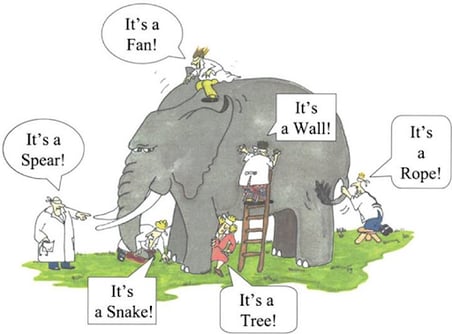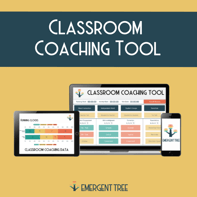Have you ever entered a conversation with a coworker, family member, or friend with an assumption? Maybe you heard something that gave you pause, and you felt you needed to bring it up to that person to address it? We’ve all done it. And maybe when we start that conversation, we realize we might not have had the whole part of the story.
If you are nodding your head affirming you’ve experienced this, you likely may have seen some trust broken or some hurt relationships.
 The core of coaching is trust, and building that trust requires gathering the complete picture when addressing issues. The parable of the blind men and an elephant tell it well. Six blind men experienced different parts of an elephant and made an assumption about what they were feeling. None saw the whole context and understood what it truly was - an elephant.
The core of coaching is trust, and building that trust requires gathering the complete picture when addressing issues. The parable of the blind men and an elephant tell it well. Six blind men experienced different parts of an elephant and made an assumption about what they were feeling. None saw the whole context and understood what it truly was - an elephant.
As a coach, you need a way to support the teachers you are mentoring with feedback that provides the whole story. You don’t want to give feedback to them just on “feeling the elephant's trunk.” You want to provide feedback based on the whole classroom experience. This is where a consistent approach can provide support as you look to coaching.
It starts with observation.
Experience what the teacher is tackling in their classroom. During this observation, take quick bits of data. On-task percentage, acknowledgment to correction ratio, or even simple frequency data for a specific behavior will give you a neutral data point to launch the conversation during the debrief. Check out our Classroom Coaching Tool to help you out with this process.
Provide measurable feedback.
What are some levels of growth you can track to help keep everyone moving forward with growth? We use Emerging, Developing, and Mastery as three phases coaches can help their teachers move through. These phases linked to essential competencies or quality indicators will provide consistent, measurable growth.
Develop an action plan.
It’s easy to feel overwhelmed if there are numerous challenges to tackle. Break it down to the next step. What is one thing that can be worked on between now and the next coaching session? This helps focus the coach and the teacher on driving change.
It takes consistency.
Coaching isn’t a “fly by the seat of your pants” process. Regular observations and coaching sessions are important. Teachers often have unpredictable schedules, so a consistent rhythm will help them feel supported and have opportunities to discuss challenges and strategize on action steps.
Why is all of this important?
We hear you. The life of a district leader is busy. Adding this layer of support can feel daunting. Your teachers are giving so much each day, investing in their students. As a coach, you can help give back to their depleted energy banks. The mental wellness of your teachers is not something you can often see through quick pass-bys or staff meetings. Experiencing with them the challenges they face allows you to find ways to support their adoption of the skills they need to continue growing.
Dig deeper and understand the why behind the struggle so you can help develop the skills in your teachers. Be a problem solver with them. Walk the journey together. We want our teachers to be able to run at full capacity, and as a coach, you are there to find what’s draining them and set a path to mitigating that challenge.
Making a behavior impact in teaching can often feel personal and be very challenging for teachers. Understanding behavior sciences can help deepen a teacher’s drive and passion for supporting their students, but it’s not always easy. It’s a learning process, and, as a coach, you are a crucial part of that process.
Let’s face it. We’re all a work in progress. We all have areas we want to improve on, and it doesn’t happen overnight. There is a path to get there, and that path has a lot of steps along the way. A coach is there to walk alongside that path helping their teachers get from one step to the next. The destination can often feel overwhelming, but if the focus is on the next step or action that can drive change, it starts to feel achievable.
 Simon Sinek shared that “our minds can be convinced, but our hearts must be won.” The coach is there to help the heart get on board with the mind. To be a champion. To inspire. To encourage that next step. To navigate obstacles. How can you, as a coach, win the hearts of your teachers as you work with them? How can you support their mental wellness by addressing their needs and helping them make that next step toward success?
Simon Sinek shared that “our minds can be convinced, but our hearts must be won.” The coach is there to help the heart get on board with the mind. To be a champion. To inspire. To encourage that next step. To navigate obstacles. How can you, as a coach, win the hearts of your teachers as you work with them? How can you support their mental wellness by addressing their needs and helping them make that next step toward success?
Check out these additional resources to help with this coaching process:
 Course: Cultivating the Classroom
Course: Cultivating the Classroom
BONUS: Group Facilitation
Interested in taking a group of your team through this course and having four one-hour live facilitated sessions focused on content review and Q&A to deepen your team’s learning? Contact us to learn more about our group packages.
 Free Webinar: Exploring Behavior & Design Thinking
Free Webinar: Exploring Behavior & Design Thinking
 Tool: Classroom Coaching Tool
Tool: Classroom Coaching Tool



Comments